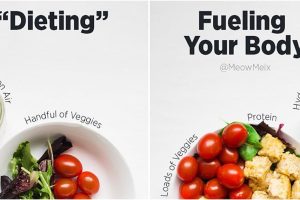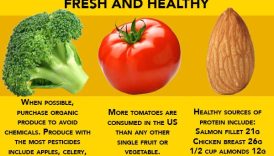Fuel Your Body Right: Essentials of a Healthy Lifestyle

Importance of Fueling Your Body Right
Fueling your body correctly is crucial for overall health and wellness. Just like a car runs better on high-quality fuel, our bodies operate optimally when provided with nutritious foods. When individuals prioritize balanced meals that include essential nutrients, they set the stage for improved energy levels, enhanced mood, and better physical performance. For example, after swapping out processed snacks for whole fruits and nuts, many people report feeling more energized throughout their day.
- Fuel Your Body Right: Essentials of a Healthy Lifestyle
- Importance of Fueling Your Body Right
- Benefits of a Healthy Lifestyle
- Nutrition Basics
- Understanding Macronutrients
- Importance of Micronutrients
- Hydration
- The Importance of Staying Hydrated
- Signs of Dehydration
- Physical Activity
- Different Types of Exercise
- Benefits of Regular Physical Activity
- Sleep and Recovery
- Importance of Quality Sleep
- Recovery Strategies for Active Individuals
- Stress Management
- Impact of Stress on Health
- Coping Mechanisms for Stress
- Meal Planning
- Benefits of Meal Planning
- Tips for Healthy Meal Prep
- Mindful Eating
- Practicing Mindful Eating Habits
- Benefits of Being Present During Meals
- Healthy Snacking
- Importance of Smart Snacking Choices
- Nutritious Snack Ideas
- Supplements
- Common Supplements for Overall Health
- Consultation with a Healthcare Provider
- Balancing Your Plate
- Building a Balanced Plate
- Portion Control Tips
- XII. Social Connections
- Importance of Social Support
- Benefits of Healthy Relationships
- XIII. Goal Setting
- Setting Realistic Health Goals
- Tracking Your Progress
- XIV. Sustainability
- Incorporating Sustainable Practices into Your Lifestyle
- Benefits of Environmental Consciousness
- XV. Conclusion
- Recap of Essential Healthy Lifestyle Practices
- Committing to Long-Term Well-Being
Benefits of a Healthy Lifestyle
Embracing a healthy lifestyle goes beyond just eating right. It encompasses various elements that contribute to a thriving life, including:
- Improved Mental Health: A balanced diet, regular exercise, and adequate sleep can boost mental well-being.
- Increased Longevity: Healthy habits contribute to a longer, more fulfilling life.
- Enhanced Immune Function: Nourishing the body helps fend off illnesses and infections.
Committing to these practices leads to holistic health benefits that transform everyday living into a more vibrant experience.
Nutrition Basics
Understanding Macronutrients
To truly fuel your body properly, it’s essential to grasp the concept of macronutrients. These are the primary components of our diet and include carbohydrates, proteins, and fats. Each plays a vital role in physical health:
- Carbohydrates: Provide energy needed for daily activities. Think whole grains, fruits, and veggies.
- Proteins: Support muscle repair and growth. Sources include lean meats, beans, and dairy.
- Fats: Essential for hormone production and nutrient absorption. Opt for healthy fats like avocados and nuts.
For instance, when Sarah shifted her focus to a balanced macronutrient intake, she noticed a significant boost in her energy levels and workout performance.
Importance of Micronutrients
While macronutrients power us up, micronutrients—vitamins and minerals—are the unsung heroes of nutrition. These nutrients are crucial for numerous bodily functions and are found in a variety of foods.
- Vitamins: Support immune function and energy production. Citrus fruits are packed with Vitamin C, while leafy greens provide Vitamin K.
- Minerals: Help with bone health and muscle function. Calcium-rich foods include dairy products, while iron can be found in legumes and red meats.
By ensuring a varied diet rich in both macronutrients and micronutrients, individuals often feel more energetic and focused. Maintenance of a colorful plate can lead to long-lasting health benefits.
Hydration
The Importance of Staying Hydrated
After exploring the essentials of nutrition, it’s time to turn our attention to hydration—another fundamental pillar of health. Staying hydrated is crucial for every cell in our body to function effectively. Water plays a role in regulating temperature, transporting nutrients, and eliminating waste. For instance, when Tom committed to drinking an extra two glasses of water daily, he noticed improved concentration at work and enhanced workout recovery. Keeping a reusable water bottle handy is an easy way to remind yourself to sip throughout the day.
Signs of Dehydration
Recognizing the signs of dehydration is vital for maintaining optimal health. Some common indicators include:
- Thirst: An obvious cue that your body needs more fluids.
- Dark Urine: A sign that you’re not taking in enough water, as well-hydrated individuals typically have light, pale urine.
- Fatigue and Dizziness: Feeling tired or lightheaded can indicate fluid deficiency.
By staying vigilant and responding to these cues, individuals can support their hydration levels and, consequently, their overall well-being. Drinking water should be seen as an essential part of daily health routines.
Physical Activity
Different Types of Exercise
Transitioning from hydration, let’s dive into the world of physical activity. Exercise is not just about hitting the gym; it encompasses a variety of activities that can cater to different interests and fitness levels. Some common types include:
- Aerobic Exercise: Activities like running, cycling, or swimming that get your heart rate up.
- Strength Training: Lifting weights or bodyweight exercises to build muscle.
- Flexibility and Balance: Yoga and Pilates not only enhance flexibility but also improve overall balance.
For example, Anna found that joining a dance class combined her love for music and fitness, making exercise enjoyable.
Benefits of Regular Physical Activity
Engaging in regular physical activity yields profound benefits for the mind and body. Here are some key advantages:
- Weight Management: Helps maintain a healthy weight and supports metabolism.
- Enhanced Mood: Physical activity boosts endorphins, leading to improved mental well-being.
- Increased Energy Levels: People often report feeling more energized and productive after regular exercise.
By integrating physical activity into daily life, individuals not only enhance their physical health but also cultivate a healthier mindset. Embracing movement doesn’t have to be tedious; finding activities you enjoy can transform your fitness journey into an exciting adventure!
Sleep and Recovery
Importance of Quality Sleep
Building on the foundation of physical activity, we arrive at another vital component of health: sleep. Quality sleep is essential not just for feeling rested but also for overall health and performance. During sleep, the body undergoes critical processes such as muscle repair, memory consolidation, and hormone regulation. For instance, when Mark started prioritizing his sleep routine, he noticed improvements in both his workout performance and mood. Ensuring 7-9 hours of sleep per night can make a world of difference.
Recovery Strategies for Active Individuals
To maximize the benefits of both exercise and sleep, active individuals should adopt effective recovery strategies. Here are a few approaches:
- Stretching and Foam Rolling: These techniques help relieve muscle tension and improve flexibility.
- Nutrition: Consuming a balanced meal post-exercise aids in muscle recovery, with protein playing a critical role.
- Rest Days: Incorporating rest days in your training schedule allows your body to repair, preventing burnout and injuries.
Employing these recovery strategies not only enhances physical performance but also supports mental clarity, allowing individuals to tackle their next workout with vigor and enthusiasm. Prioritizing recovery is key to achieving long-term fitness goals.
Stress Management
Impact of Stress on Health
Continuing from the importance of recovery, it’s crucial to address one of the primary barriers to effective recovery: stress. High levels of stress can significantly impact health, leading to issues such as anxiety, insomnia, and even chronic conditions like heart disease. Personally, when Lisa ran a high-stress project at work, she noticed that her energy levels dipped and her workouts became less effective. This experience highlighted how emotional and physical health are interlinked.
Coping Mechanisms for Stress
To combat stress, various coping mechanisms can be implemented effectively:
- Mindfulness and Meditation: Practicing mindfulness can help ground individuals and lower anxiety levels.
- Physical Activity: Engaging in regular exercise can act as a natural stress reliever.
- Deep Breathing Exercises: Taking time to focus on breath can bring immediate calmness and reduce tension.
Incorporating these strategies into daily life can foster resilience against stress, ultimately enhancing both mental clarity and physical health. Recognizing and managing stress proactively empowers individuals to maintain balance and enjoy a more fulfilling lifestyle.
Meal Planning
Benefits of Meal Planning
Building on the importance of managing stress, another effective tool for maintaining health is meal planning. By organizing meals ahead of time, individuals can streamline their grocery shopping and ensure they have healthy options readily available. The benefits are plentiful:
- Time-Saving: Dedicating a couple of hours each week to plan meals saves time during busy weekdays.
- Cost-Effective: Planning helps avoid impulse buying and reduces food waste.
- Healthier Choices: When meals are pre-planned, it’s easier to stick to nutritious options and avoid unhealthy last-minute decisions.
For example, when Jake started meal prepping, he noticed not only saved time but also an improvement in his overall health.
Tips for Healthy Meal Prep
To make meal planning effective, consider these handy tips:
- Start Simple: Choose a few recipes for the week that are easy to prepare.
- Batch Cook: Prepare larger portions and store them in individual containers for quick access.
- Incorporate Variety: Mix different proteins, grains, and vegetables to keep meals interesting.
By following these strategies, individuals can create a practical meal planning routine that supports their health and well-being, making it easier to prioritize nutritious eating in everyday life.
Mindful Eating
Practicing Mindful Eating Habits
Transitioning from meal planning, another dimension of a healthy lifestyle is mindful eating. This practice involves paying full attention to the experience of eating, focusing on flavors, textures, and your body’s hunger cues. Here are a few ways to incorporate mindful eating habits:
- Slow Down: Take your time to chew food thoroughly and savor each bite.
- Eliminate Distractions: Put away electronic devices and focus solely on your meal.
- Listen to Your Body: Check in with your hunger and fullness levels throughout the meal.
For instance, when Emily started to eat without distractions, she found herself enjoying her meals more and feeling satisfied with smaller portions.
Benefits of Being Present During Meals
Embracing mindfulness at mealtimes can yield numerous benefits:
- Improved Digestion: Eating slowly aids the digestive process and can reduce bloating.
- Weight Management: Being aware of portion sizes helps prevent overeating.
- Enhanced Enjoyment: Engaging fully with food makes meals more pleasurable.
Overall, mindful eating fosters a positive relationship with food, promoting both psychological satisfaction and physical health. By integrating mindfulness into meals, individuals can transform eating from a routine task into an enriching experience.
Healthy Snacking
Importance of Smart Snacking Choices
Continuing from the practice of mindful eating, let’s talk about healthy snacking—a crucial aspect of maintaining energy levels throughout the day. Smart snacking can help bridge the gap between meals and keep hunger at bay. Choosing the right snacks not only curbs cravings but also contributes to overall nutrition. For example, when Alex switched from chips to mixed nuts, he noticed a steady energy level without the sugar crash that often followed less nutritious snacks.
Nutritious Snack Ideas
Here are some nutritious snack ideas to incorporate into your diet:
- Greek Yogurt with Berries: Packed with protein and antioxidants, this snack is both delicious and satisfying.
- Veggies with Hummus: Crunchy vegetables provide fiber while hummus adds healthy fats and protein.
- Apple Slices with Nut Butter: A perfect combination of carbs, protein, and fats that satisfies sweet cravings.
By making conscious choices in snacking, individuals can enhance their health and energy while enjoying a variety of tasty foods. Smart snacking not only fuels the body but also complements a balanced diet!
Supplements
Common Supplements for Overall Health
As we shift our focus from healthy snacking, it’s essential to consider the role of supplements in supporting overall wellness. While a balanced diet is the optimal way to obtain nutrients, some individuals may find supplementation beneficial. Common supplements include:
- Multivitamins: Helping fill nutritional gaps, especially for those with dietary restrictions.
- Omega-3 Fatty Acids: Promoting heart and brain health, often found in fish oil capsules.
- Vitamin D: Crucial for bone health, particularly in regions with limited sunlight.
Laura experienced improvements in her energy levels and joint comfort after incorporating an omega-3 supplement into her routine.
Consultation with a Healthcare Provider
Before starting any supplement regimen, consulting with a healthcare provider is critical. Professional guidance ensures that individuals choose the right supplements based on their unique health needs and conditions. This step can prevent potential interactions with medications and help identify any specific deficiencies. Having this conversation helped Tom determine which supplements aligned with his fitness goals and overall health, providing him with confidence in his choices. By prioritizing informed decisions, individuals can effectively enrich their health journeys without the guesswork.
Balancing Your Plate
Building a Balanced Plate
Continuing from the importance of supplements, let’s explore how to achieve a balanced meal on your plate. A balanced plate includes a variety of food groups to ensure you are getting essential nutrients. Aim for:
- Protein: Fill one-quarter of your plate with lean proteins like chicken, tofu, or legumes.
- Whole Grains: Another quarter should consist of whole grains like brown rice or quinoa.
- Fruits and Vegetables: Half your plate should be covered with colorful fruits and vegetables for vitamins and minerals.
Samantha found that visually separating her plate in this way helped her make healthier meal choices during dinner time.
Portion Control Tips
Maintaining healthy portion sizes is equally important. Here are some practical tips to help with portion control:
- Use Smaller Plates: Opting for a smaller plate can naturally help limit portion sizes.
- Mindful Serving: Instead of serving food family-style, serve individual portions to avoid overeating.
- Listen to Hunger Cues: Pay attention to your body’s signals to stop eating when you’re satisfied, not stuffed.
By focusing on a balanced plate and practicing portion control, individuals can optimize their meals for better nutrition—leading to enhanced wellness and satisfaction at mealtime. This mindful approach makes it easier to enjoy food while nourishing the body effectively!
XII. Social Connections
Importance of Social Support
As we move from the concept of balancing our plates, let’s appreciate the role of social connections in enhancing overall well-being. Social support is crucial in navigating life’s ups and downs. Friends and family provide emotional backing, encouragement, and a sense of belonging, all of which can significantly impact mental health. For instance, when David faced challenges at work, discussing them with friends helped him gain perspective and feel less isolated.
Benefits of Healthy Relationships
Fostering healthy relationships brings a myriad of benefits:
- Improved Mental Health: Positive connections can reduce feelings of anxiety and depression.
- Enhanced Resilience: Supportive relationships help individuals cope better during stressful times.
- Accountability: Having friends or family involved in wellness goals can motivate healthier choices.
Building and maintaining social connections creates a network that nurtures emotional health, encourages personal growth, and enriches everyday experiences. By investing time in relationships, individuals can ensure a more balanced and fulfilling life.
XIII. Goal Setting
Setting Realistic Health Goals
Continuing from the discussion on social connections, let’s delve into the importance of goal setting in achieving a healthier lifestyle. Setting realistic health goals is essential for sustainable progress. Instead of vague objectives like “getting healthier,” aim for specific targets such as “exercise for 30 minutes, three times a week.” This clarity provides direction and motivation. For example, when Mia set a goal to drink an extra glass of water daily, she found it manageable and achievable.
Tracking Your Progress
Once goals are set, tracking progress is vital for maintaining motivation. Here are some effective strategies:
- Journaling: Record daily food intake and physical activity to visualize improvements.
- Use Apps: Many apps can help keep track of habits, making it easy to see how you’re doing over time.
- Celebrate Milestones: Acknowledge small victories to stay motivated on your journey.
By regularly assessing progress and adjusting goals as needed, individuals can create a dynamic approach to health that fosters growth, self-awareness, and continued commitment to their well-being. Embracing this process makes the journey enjoyable and enriching!
XIV. Sustainability
Incorporating Sustainable Practices into Your Lifestyle
As we transition from the importance of goal setting, it’s essential to consider sustainability within our health journey. Incorporating sustainable practices not only benefits personal wellness but also protects the environment. Simple changes can have a significant impact, such as:
- Choosing Local Produce: Supporting local farmers reduces carbon footprints.
- Reducing Plastic Use: Opt for reusable bags, containers, and water bottles.
- Plant-Based Meals: Exploring plant-rich diets can be both healthy and environmentally friendly.
When Jake started buying seasonal fruits and vegetables from a local farmer’s market, he enjoyed fresher produce and felt more connected to his community.
Benefits of Environmental Consciousness
Being environmentally conscious yields multiple benefits beyond sustainability:
- Healthier Communities: Sustainable practices often lead to cleaner air and water quality.
- Increased Awareness: Understanding the impact of our choices fosters a sense of responsibility.
- Connection to Nature: Engaging with sustainability initiatives deepens appreciation for the planet.
By adopting environmentally-conscious habits, individuals not only contribute to a healthier planet but also enhance their own well-being, creating a harmonious balance between personal and planetary health. Embracing these practices can pave the way for a more responsible and fulfilling lifestyle.
XV. Conclusion
Recap of Essential Healthy Lifestyle Practices
As we conclude this journey through various aspects of health, it’s valuable to recap the essential practices that contribute to a healthy lifestyle. From balanced nutrition and hydration to regular physical activity and mindful eating, each element plays a critical role in overall well-being. Additionally, fostering social connections, setting realistic goals, and embracing sustainability enhances your journey toward holistic health.
- Nutrition: Focus on balanced plates with smart snacking.
- Physical Activity: Engage in exercises you enjoy.
- Mindfulness: Practice being present during meals.
When Sarah applied these principles, she found herself feeling more vibrant and centered.
Committing to Long-Term Well-Being
Committing to long-term well-being requires consistency and dedication. It’s important to remember that health is a lifelong journey, and small, sustainable changes can lead to meaningful results. Regularly reassessing goals and being adaptable can keep motivation alive. As you navigate your path to health, embrace the ups and downs, celebrate your progress, and remain open to learning. With commitment and intention, anyone can cultivate a balanced, fulfilling, and sustainable lifestyle that fosters not only personal health but also a deeper connection to the world around them.





